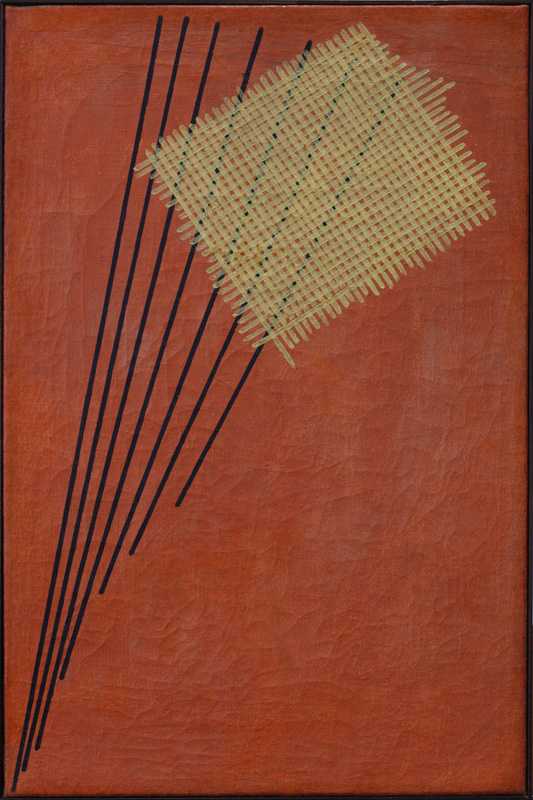THE RAY OF DISPLACEMENT (6)
By:
February 12, 2024

Construction no. 95 (1919)
Harriet Prescott Spofford’s “The Ray of Displacement” — which makes the shocking suggestion, at one point, that Jesus may have been a dimension-hopping scientist — was first published October 1903 in The Metropolitan Magazine, with illustrations by Lester Ralph. It has appeared in proto-sf collections edited by Sam Moskowitz, Mike Ashley, and others. HiLoBooks is pleased to serialize it here for HILOBROW’s readers.
ALL INSTALLMENTS: 1 | 2 | 3 | 4 | 5 | 6 | 7 | 8.
I was at the height of my endeavor when St. Angel brought me my pardon. He had so stated my case to the Governor, so spoken of my interrupted career, and of my prison conduct, that the pardon had been given. I refused to accept it. “I accept,” I said, “nothing but vindication, if I stay here till the day of judgment!”
“But there is no provision for you now,” he urged. “Officially you no longer exist.”
“Here I am,” I said, “and here I stay.”
“At any rate,” he continued, “come out with me now and see the Governor, and see the world and the daylight outdoors, and be a man among men a while!”
With the stipulation that I should return, I put on a man’s clothes again and went out the gates.
It was with a thrill of exultation that, exhibiting the affairs in my room to St. Angel, finally I felt the vibrating impulse that told me I had received the ray of the larger displacement. In a moment I should be viewless as the air.
“Where are you?” said St. Angel, turning this way and that. “What has become of you?”
“Seeing is believing,” I said. “Sometimes not seeing is the naked truth.”
“Oh, but this is uncanny!” he exclaimed. “A voice out of empty air.”
“Not so empty! But place your hand under the second coil. Have no fear. You hear me now,” I said. “I am in perhaps the Fourth Dimension. I am invisible to any one not there — to all the world, except, presently, yourself. For now you, you also, pass into the unseen. Tell me what you feel.”
“Nothing,” he said. “A vibration — a suspicion of one. No, a blow, a sense of coming collapse, so instant it has passed.”
“Now,” I said, “there is no one on earth with eyes to see you but myself!”
“That seems impossible.”
“Did you see me? But now you do. We are on the same plane. Look in that glass. There is the reflection of the room, of the window, the chair. Do you see me? Yourself?”
“Powers of the earth and air, but this is ghastly!” said St. Angel.
“It is the working of natural law. Now we will see the world, ourselves unseen.”
“An unfair advantage.”
“Perhaps. But there are things to accomplish to-day.” What things I never dreamed; or I had stayed on the threshold.
I wanted St. Angel to know the manner of man this Brant was. We went out, and arrested our steps only inside Brant’s office.
“This door is always blowing open!” said the clerk, and he returned to a woman standing in a suppliant attitude. “The Judge has gone to the races,” he said, “and he’s left word that Tuesday morning your goods’ll be put out of the house if you don’t pay up!” The woman went her way weeping.
Leaving, we mounted a car; we would go to the races ourselves. I doubt if St. Angel had ever seen anything of the sort. I observed him quietly slip a dime into the conductor’s pocket — he felt that even the invisible, like John Gilpin, carried a right. “This opens a way for the right hand undreamed of the left,” he said to me later.
It was not long before we found Judge Brant, evidently in an anxious frame, his expanse of countenance white with excitement. He had been plunging heavily, as I learned, and had big money staked, not upon the favorite but upon Hannan, the black mare. “That man would hardly put up so much on less than a certainty,” I thought. Winding our way unseen among the grooms and horses, I found what I suspected–a plan to pocket the favorite. “But I know a game worth two of that,” I said. I took a couple of small smooth pebbles, previously prepared, from the chamois bag into which I had put them with some others and an aluminum wafer treated for the larger displacement, and slipped one securely under the favorite’s saddle-girth. When he warmed to his work he should be, for perhaps half an hour, at the one-billionth point, before the virtue expired, and capable of passing through every obstacle as he was directed.
“Hark you, Danny,” then I whispered in the jockey’s ear.
“Who are you? What — I — I — don’t —” looking about with terror.
“It’s no ghost,” I whispered hurriedly. “Keep your nerve. I am flesh and blood — alive as you. But I have the property which for half an hour I give you — a new discovery. And knowing Bub and Whittler’s game, it’s up to you to knock ’em out. Now, remember, when they try the pocket ride straight through them!”
RADIUM AGE PROTO-SF: “Radium Age” is Josh Glenn’s name for the nascent sf genre’s c. 1900–1935 era, a period which saw the discovery of radioactivity, i.e., the revelation that matter itself is constantly in movement — a fitting metaphor for the first decades of the 20th century, during which old scientific, religious, political, and social certainties were shattered. More info here.
SERIALIZED BY HILOBOOKS: James Parker’s Cocky the Fox | Annalee Newitz’s “The Great Oxygen Race” | Matthew Battles’s “Imago” | & many more original and reissued novels and stories.
